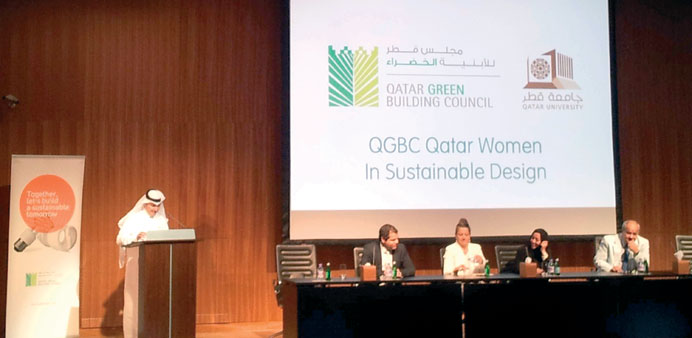Out of a half million people working in the construction sector, only 2,800 are women, including just 143 Qataris, a recent Qatar Statistics Authority survey says.
“When you enter a construction company (in Qatar), you realise very quickly that all your colleagues are men and you hardly find a woman, except in administrative tasks,” said Sheikha Athba bint Thamer al-Thani, who, since joining Qatari Diar Vinci Construction (QDVC) in June 2010, has advanced to become Chief Support Services and Sustainable Development Manager.
She was speaking at an event yesterday organised by the Qatar Green Building Council (QGBC) and Qatar University (QU) that focused on the vital role women play in sustainable development and environmental management at the Qatar National Convention Centre.
“Before I joined QDVC, not one woman was present in the executive committee. I want to highlight why we experience this situation and how we can convince both men and women that females have a role to play in an industry representing billions of Qatari Riyals,” said Sheikha Athba bint Thamer al-Thani, before drawing attention to cultural limitations, long working hours, and a variety of other restrictions hindering the potential of women in sustainable development.
“Despite facing a number of hurdles, women are as capable as men in leading the construction industry in Qatar. They continue to be underrepresented in the mainstream media as well as in the scholarly written material,” said Engneer Rasha al-Sulaiti, vice-chair of QGBC who is also Project Management Director at Qatar Foundation’s Capital Projects and Facilities Management division – a department where the ratio of Qatari women versus men now stands at 52% to 48% respectively.
A number of industry-leading experts from QGBC and QU took part in the discussion, affirming women’s critical contributions to Qatar’s sustainable development, and proposing actions to strengthen their role by eliminating social and logistical obstacles to equal participation.
Providing an alternative perspective on the issue, Dr Yasser Maghoub, an associate professor at Qatar University who spoke on design for recycling said, “I don’t think the problem is that they are women. The job market has its own demands, limitations and directions. The market needs fresh talent and fresh minds. The market is growing, especially with the projects for 2022. It doesn’t have time to train people, and so they bring professionals from outside (of Qatar). Our efforts are underway to train as quickly and professionally as possible to meet the demands of the current market.”
Dr Maghoub’s students were on hand with their peers from QU’s Engineering Department to offer their own insight as young women studying the field. The students presented their projects on a range of topics in sustainable design and development.
QU professors Dr Anna Grichting and Dr Hussam Salama facilitated discussions with the students on their projects, before a lively panel debate reviewed the day’s key theme and messages with an engaged audience.

Vice-chair QGBC Engineer Rasha al-Sulaiti and QU professors Dr Yasser Maghoub, Dr Anna Grichting and Dr Hussam Salama at the workshop.
